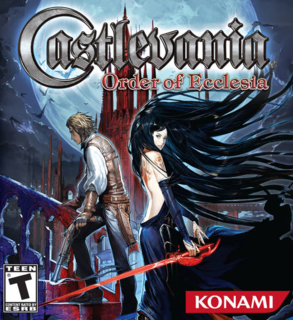So close, and yet so far away
Graphics:
7/10
Well, the sprites haven't change much, at all. The real thing here is the art style, going back to the days of the GBA games. It's an interesting style, and manages to give it a different feel than the other two DS entries, but you're REALLY telling me you can't make the sprites any more detailed than a game that's what, five years old? Despite obvious laziness, this isn't bad enough to disqualify the game's art style.
Sound:
9/10
Castlevania games have a rep for good music, and this one is no different. All of the sound from the original Castlevania is present, which I thought was a cool addition. The intro song, which is remixed later in the game, is especially well done.
Story:
6/10
The main character, Shanoa, is part of a clan called Ecclesia, which has the intent to prevent Dracula's revival. During a ritual to give Shanoa some special power, Albus, a jealous disciple of Barlowe, the clan leader, apparently causes the ritual to go wrong and Shanoa ends up losing her memory. From there there's some interesting twists and turns, but it's still nothing epic, but it gains points from being different enough than "Hey, let's kill Dracula!"
Gameplay:
6.5/10
This is where things start to fall apart. Remember how much slower PoR was than DoS? Well, you're going to be dissapointed, because I believe OoE runs even slower than DoS. But fret not. Now, here comes the best and worst part of the game at the same time: The Gylph system. Overall, the gylphs are pretty cool because you can now sling around magic with just regular attacks, and the fact you can now combo your gylphs kinda makes up for the speed loss. Now, what's the problem with this? The gylph system defeats it's own purpose, a rather stupid move. The existence of enemy weaknesses clearly intends you to change your gylphs on occasion, but the problem is, you can change your gylphs in a heartbeat before the enemy can even react, making it no harder to defeat enemies but MUCH more annoying. The existence of weaknesses does nothing but bog down the game for this very reason. Now, if enemies could attack us while we were fooling around in the menu, this would be a very different story, but nope, just change your gylphs and that skeleton you couldn't damage before is now an easy kill. It was supposed to make combat more strategic....but it doesn't.
Now, another thing people praise about this game is the difficulty. This is a rather exaggerated claim. Apart from the beginning of the game, where your character is rather weak, Ecclesia is rather easy even for the amateur gamer, take it from an amateur himself. There's a learning curve for the second boss, but once you bypass that, you're golden.
One thing OoE DOES benefit from is a much better quest structure than PoR. It's various people giving out different quests instead of just the same person, and you also have to FIND these people, a rather interesting part of the game IMO. What's more, while not not much, they DO vary from "Get me this item" or "Go kill this many of that monster". Some quests will have you using a camera to take pictures of monsters, playing hide and seek in the dark, even going through a rather irritating secret area [Training arena]. When you mash it all together, OoE has it's ups and downs, but is a decent game in the end.
Controls:
10/10
Very few games have control issues, and luckily, OoE is not one of them.
Replay:
4/10
Eh, you might want to try a fresh Hard run, or do a new game + once or twice, but other than that, OoE offers very little in the way of replay value.
Overall:
7/10
It's quite a ways off from epic, but OoE is still a good game in it's own right. Also, being a handheld and all, it's cheaper, so you can't really say you didn't get what you paid for.

